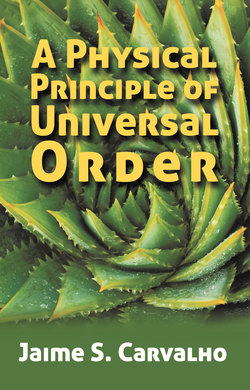Читать книгу A Physical Principle of Universal Order - Jaime S. Carvalho - Страница 5
На сайте Литреса книга снята с продажи.
1. Order in physical nature
ОглавлениеOur relation to the world surrounding us is very peculiar. From the surface of earth we can take the outsider’s view of stars and planets, but not of the universe as a whole. We live inside the universe and cannot step outside to take a good look at it. Humans are just limited to what the universe allows them to observe. This unique situation lies outside the scope of the scientific method of investigation. Can we ever truly understand how the universe works?
With observation at its base, the present scientific method uses numbers and quantities to describe and measure what is observed—size of stars, speed of light, weight of atoms. But there are two problems with this approach: numbers do not exist in nature, and structure is not wholly quantitative.
All existing physical laws were deducted by the physicists who have made measurements in a certain way and arrived at specific conclusions through the application of mathematical and statistical methods, based on numbers. Physical laws are thus intellectual abstractions and not laws directly derived from nature. In other words, our knowledge of the universe was constructed by the physicists in order to understand the world. It may or may not correspond to reality. Physical laws are not natural laws.
At present state of knowledge, we have two major physical theories describing the workings of the universe: quantum mechanics and general relativity, the first applicable to the atomic and subatomic realm and the other to the astronomical realm. These theories were derived from very different assumptions, and attempts to unify them by mathematical means have been unsuccessful. Single reality continues divided into two irreconcilable parts.
It is the quantum viewpoint that we must accept as a basic fact an uncertainty principle and the notion that the laws of nature are inherently statistical. Relativity theory, in turn, asserts that we can perceive instantaneous coincidences and assumes the reversibility of the physical laws. Our world, however, does not behave this way. Nature is not probabilistic, all our experiences require a certain amount of time, and natural laws do not appear to be reversible. It is a fact of life that we grow older with time and never get younger and in metabolism, carbon dioxide is always produced from the foodstuffs and then must be excreted.
Mathematics is a purely abstract science but an essential tool to physics, particularly in gaining insight into the workings of internal structure that cannot be directly observed. It is indispensable to, but cannot replace, physics.
Yet, modern theoretical physics, and even research in physics, have been guided by mathematics alone. This situation is leading to the construction of an artificial mathematical world devoid of logic, which stands between us and reality. Like the philosophical thought in Plato’s time, the thought of modern fundamental physics is carrying us further away from the natural world.
Since we are a part of nature, we should also obey its laws. If so, our mysterious connection to nature—the causal relation— should be easier to reveal by studying the biological systems, which are low-energy systems, rather than the high-energy physical systems where everything happens too fast to be observed. Contrary to what would be expected, the operation of the universe may be easier to understand from the physics of biology.
